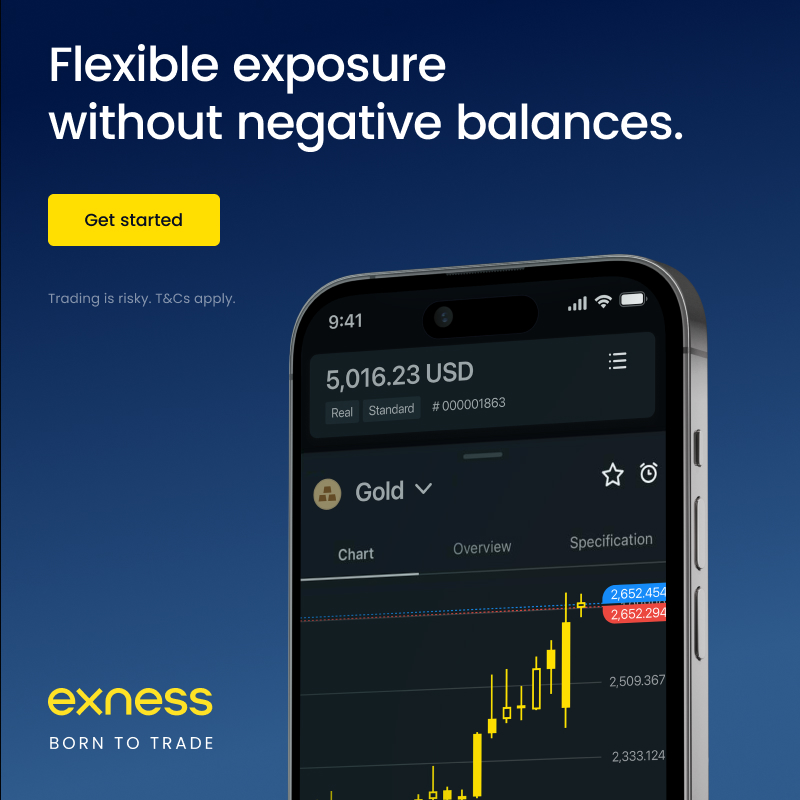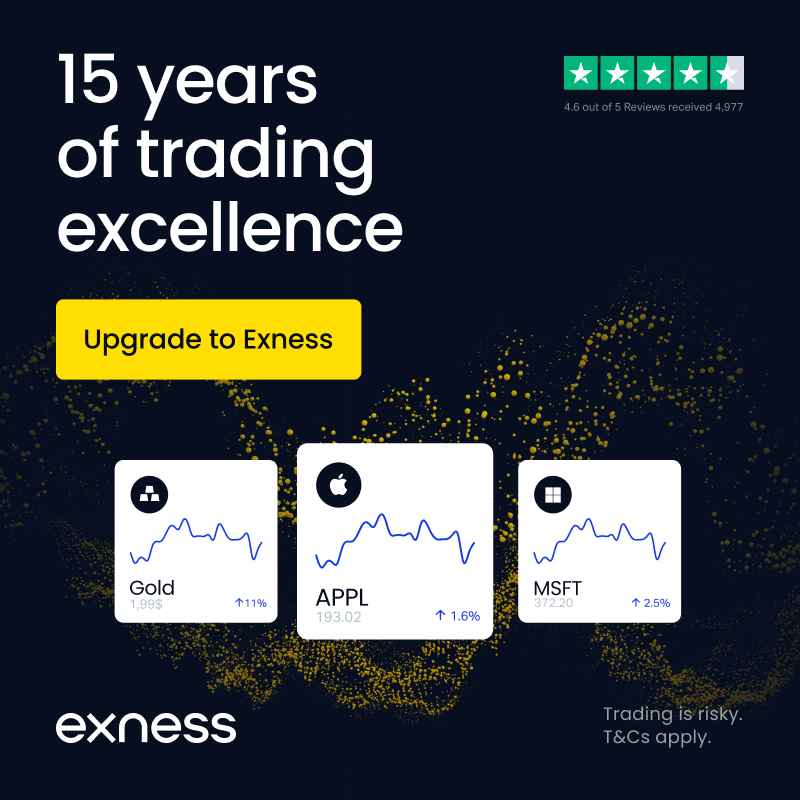
7 minute read
Exness vs FxPro: Which Broker Is Better?
from Exness
by Exness Blog
Choosing between Exness vs FxPro can feel like picking between two top-tier athletes—both are strong contenders, but the winner depends on your specific needs. If you’re a trader wondering which broker is better for your forex journey in 2025, you’ve landed in the right place. In this article, I’ll break down the key differences between Exness and FxPro, covering fees, platforms, regulation, and more, to help you decide which one suits your trading style. Let’s dive in!

✅ Trade with Exness now: Open An Account or Visit Brokers 👈
Overview: Exness vs FxPro at a Glance
Exness, founded in 2008, is a Cyprus-based broker with a massive global presence, serving over 1 million active traders. It’s known for ultra-low spreads, instant withdrawals, and a user-friendly experience, particularly for beginners and high-volume traders. FxPro, established in 2006, is also Cyprus-based and shines with its diverse platform options, including the popular cTrader, and a broader range of trading instruments. Both brokers are highly regulated and trusted, but they cater to slightly different trader profiles.
So, which one’s better? It depends on what you prioritize—low costs and fast withdrawals (Exness) or platform variety and advanced tools (FxPro). Let’s unpack the details.
Regulation and Trust: Are They Safe?
Safety first, right? Both Exness and FxPro are rock-solid in terms of regulation, so you can trade with confidence.
· Exness: Regulated by multiple authorities, including the FCA (UK), CySEC (Cyprus), FSCA (South Africa), and others like FSA (Seychelles) and FSC (Mauritius). It segregates client funds, offers negative balance protection, and boasts a monthly trading volume of over $4.5 trillion, showcasing its reliability. It’s also a member of the Financial Commission, offering up to €20,000 in investor compensation.
· FxPro: Equally secure, FxPro is regulated by the FCA, CySEC, and SCB (Bahamas). It works with top-tier banks like Barclays for fund security and has €100 million in company capital, adding transparency. Like Exness, it provides segregated accounts and negative balance protection, with deposit protection up to £85,000 via the UK’s FSCS.
Verdict: It’s a tie. Exness has broader global regulatory coverage, which is great for international traders, while FxPro’s transparency with its capital reserves is a big plus for those prioritizing financial stability. Both are trustworthy, so your funds are safe either way.
Trading Fees: Where’s the Better Deal?
Nobody wants to lose profits to high fees, so let’s talk costs.
· Exness: Known for ultra-low trading fees, Exness is a favorite for cost-conscious traders. Its commission-free accounts have spreads over 50% lower than FxPro’s, and commission-based accounts can be up to 90% cheaper. For example, spreads on major forex pairs can start from 0.0 pips on raw spread accounts, and there’s no minimum withdrawal amount. Swap-free accounts are also available across all platforms.
· FxPro: FxPro offers competitive spreads, starting from 0.2 pips on its cTrader accounts, but its commission-free accounts are pricier compared to Exness. You’ll also face a $15 inactivity fee, which Exness doesn’t charge. However, FxPro’s cTrader accounts are a great deal for traders who want low-cost, commission-based trading with deep liquidity.
Verdict: Exness wins for lower overall trading costs, especially for commission-free accounts and forex-focused traders. FxPro is better for those using cTrader, where its pricing is more competitive.
Trading Platforms: Which One’s More User-Friendly?
Your trading platform is your cockpit—here’s how Exness vs FxPro stack up.
· Exness: Offers MetaTrader 4 (MT4), MetaTrader 5 (MT5), its proprietary Exness Terminal, and a mobile Trade App. These platforms are intuitive, support one-click trading, trailing stops, and pending orders, and are ideal for beginners and scalpers. Exness also supports social trading, letting you copy strategies from experienced traders.
· FxPro: Goes big on platform variety with MT4, MT5, cTrader, and its proprietary FxPro Edge. cTrader is a standout for advanced traders, offering superior charting and fast execution. FxPro’s platforms are customizable, making them a hit with experienced traders who want flexibility.
Verdict: FxPro takes the lead if you want multiple platform options, especially cTrader for advanced trading. Exness is better for beginners or those who prefer simpler, reliable platforms like MT4/MT5 and its proprietary options.

✅ Trade with Exness now: Open An Account or Visit Brokers 👈
Account Types: Flexibility for Every Trader
Different traders need different accounts—here’s what each broker offers.
· Exness: Provides nine account types, from the Standard Cent Account (no minimum deposit) to Pro Accounts with tight spreads and market execution (minimum deposit $500). This variety suits beginners, pros, and high-leverage traders (up to 1:2000 via its Seychelles entity). Swap-free Islamic accounts are also available.
· FxPro: Offers a range of accounts, including Standard, Swap-Free, and MAM/PAMM accounts for managed trading. While FxPro’s account options are diverse, they’re less varied than Exness’s, and the minimum deposit is typically higher (around $100).
Verdict: Exness wins for its broader range of account types and lower entry barriers, making it ideal for beginners and small-budget traders. FxPro is great for those needing managed accounts or cTrader-specific options.
Trading Instruments: What Can You Trade?
Diversifying your portfolio? Here’s what each broker brings to the table.
· Exness: Offers over 220 CFD markets, including 90+ forex pairs, gold, silver, oil, stocks, indices, metals, energies, cryptocurrencies, and commodities. It’s particularly strong for 24/7 crypto trading.
· FxPro: Provides over 260 instruments, including forex, futures, indices, metals, energies, crypto, and stocks. It has a slight edge in futures contracts and share CFDs but lacks 24/7 crypto trading.
Verdict: FxPro offers a broader range of instruments, especially for futures traders. Exness is better for crypto enthusiasts who want round-the-clock trading.
Deposits and Withdrawals: How Fast Can You Access Your Money?
Fast and free fund access is a must for active traders.
· Exness: Shines with instant to near-instant withdrawals (98% processed in under a minute) via e-wallets, crypto, and cards. There’s no minimum withdrawal amount, and deposits/withdrawals are free.
· FxPro espacio: Withdrawals are fast (typically same-day) but not instant like Exness. There are no internal withdrawal fees, but the process can depend on payment providers. Minimum deposits start at $100.
Verdict: Exness is the clear winner for lightning-fast, no-hassle withdrawals, especially for active traders. FxPro is solid but can’t match Exness’s speed.
Customer Support: Who’s Got Your Back?
Good support can save the day when things go wrong.
· Exness: Offers 24/7 support in 14 languages via live chat, email, and phone. Traders praise its responsiveness and helpfulness, though some report occasional delays during peak times.
· FxPro: Also provides 24/7 multilingual support, with slightly faster live chat response times during busy hours. Its support is highly rated for professionalism.
Verdict: FxPro edges out slightly for faster live chat, but both brokers offer excellent support.
Education and Tools: Boosting Your Trading Game
Both brokers provide resources to help you grow as a trader.
· Exness: Offers an economic calendar, daily market reviews, trading signals, and technical analysis tools. However, its educational content is less comprehensive than some competitors.
· FxPro: Provides webinars, tutorials, market analysis, and advanced charting tools, especially on cTrader. Its educational resources are robust but not as extensive as some other major brokers.
Verdict: FxPro has a slight advantage for its advanced tools and charting, especially for experienced traders. Exness is solid but leans more basic.
Who Should Choose Exness?
Exness is your go-to if you:
Want ultra-low spreads and trading fees.
Need instant withdrawals and no minimum deposit.
Prefer simple, beginner-friendly platforms like MT4/MT5.
Trade crypto 24/7 or need high leverage (up to 1:2000).
Are a beginner or small-budget trader.
Who Should Choose FxPro?
FxPro is the better pick if you:
Love platform variety, especially cTrader for advanced trading.
Trade futures or want a broader range of instruments.
Value customizable platforms and deep liquidity.
Are an experienced trader who doesn’t mind slightly higher fees for premium features.
Final Thoughts: Exness or FxPro in 2025?
Both Exness vs FxPro are top-notch brokers, but your choice depends on your trading goals. Exness is unbeatable for low costs, fast withdrawals, and accessibility, making it ideal for beginners, scalpers, and crypto traders. FxPro stands out for its platform flexibility, cTrader access, and broader instrument range, catering to experienced traders who want advanced tools.
Still unsure? Try their demo accounts to test the waters. Ultimately, Exness is the better all-rounder for most traders, especially if cost and speed are your priorities. But if you’re a platform junkie or trade futures, FxPro might be your perfect match. What’s your trading style, and which broker are you leaning toward? Let me know in the comments!
✅ Trade with Exness now: Open An Account or Visit Brokers 👈
Read more:










